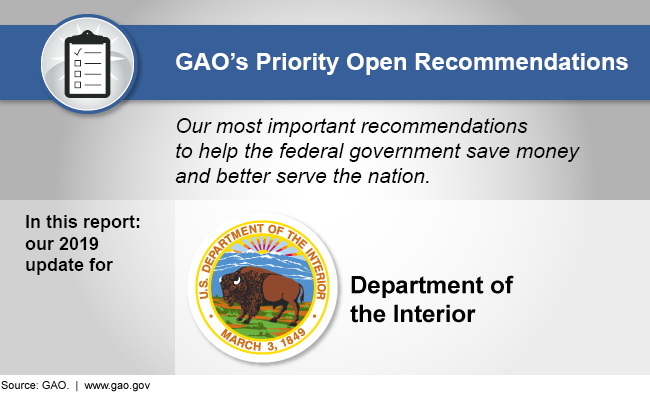Priority Open Recommendations: Department of the Interior
Fast Facts
Each year, we make more than 1,000 recommendations to help improve the federal government. We alert department heads to the recommendations where they can save the most money, address issues on our High Risk List, or significantly improve government operations.
This report outlines our 7 priority open recommendations for the Department of the Interior as of April 2019.
For example, this year we recommended that Interior develop a process to provide Indian tribes with information to administer programs using self-determination contracts.
Since our previous letter in March 2018, Interior implemented 1 of our priority recommendations.

Graphic showing that this report discusses GAO's 2019 priority recommendations for the Department of the Interior
Highlights
What GAO Found
In March 2018, GAO identified eight priority recommendations for the Department of the Interior (Interior). Since then, Interior has implemented two of the eight recommendations. In May 2018, the Bureau of Indian Education (BIE) provided documentation that it finalized and implemented written procedures and a risk-based approach to oversee BIE school expenditures of major education programs, including Interior's School Equalization Program and Education's Title I and Individuals with Disabilities Education Act programs.
In April 2019, GAO identified one new priority recommendation for Interior, bringing the total number to seven. These recommendations involve the following areas:
- improving oversight of oil and gas activities,
- taking action to ensure safety and health at BIE school facilities,
- improving BIA's management of energy development on Indian lands, and
- reducing factors that hinder tribal administration of federal programs.
Interior's continued attention to these issues could lead to significant improvements in government operations.
Why GAO Did This Study
Priority recommendations are open GAO recommendations that warrant priority attention from heads of key departments or agencies because their implementation could save large amounts of money; improve congressional and/or executive branch decision making on major issues; eliminate mismanagement, fraud, and abuse; or ensure that programs comply with laws and funds are legally spent, among other benefits. Since 2015 GAO has sent letters to selected agencies to highlight the importance of implementing such recommendations.
For more information, contact Mark Gaffigan, Managing Director, Natural Resources and Environment at (202) 512-3841 or gaffiganm@gao.gov.
